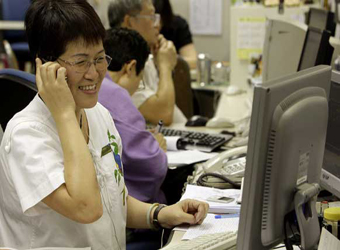Asian stocks rose on Monday on fading risk aversion as the dollar clawed back losses. Markets also digested headlines concerning developments out of the People’s Bank of China and European Central Bank announced at the weekend.
The Nikkei 225 rallied 1.42 percent and South Korea’s benchmark Kospi index tacked on 0.79 percent as geopolitical tensions eased on the Korean peninsula over the weekend.
The rally took place after no North Korean missile launches materialized on Sept. 9, the anniversary of the country’s founding. There had been speculation in the lead up to the weekend that North Korea could conduct its next missile test then to celebrate the occasion.
Down Under, the S&P/ASX 200 rose 0.76 percent, with the information technology sub-index leading gains. The heavily-weighted financials sub-index added 1.57 percent.
Greater China markets also gained. Hong Kong’s Hang Seng Index jumped 0.99 percent. On the mainland, the Shanghai Composite was up 0.13 percent and the Shenzhen Composite gained 0.356 percent.
The positive sentiment also gave Dow futures a boost. Dow Jones industrial average futures were up 117 points at 21,929, at 12:12 p.m. HK/SIN.
Against the Japanese currency, the dollar rose nearly 0.6 percent to fetch 108.43 yen after plumbing a low of 107.31 in the last session. The dollar stayed firm after the release of Japan July core machinery orders, which showed an increase of 8 percent from June, Reuters said. The rise in core orders was the first in four months, according to Reuters.
“With North Korea seemingly holding back on its intercontinental ballistic missile test for now, there is a small degree of risk relief in market, resulting in the paring of long positions in safe havens,” Chang Wei Liang, a strategist at Mizuho Bank, explained in a note.
China’s central bank, the People’s Bank of China, intends to ease requirements for financial institutions to set aside foreign-exchange risk reserves for trading yuan forwards as of Sept. 11, Reuters said.
“Scrapping this requirement put in place in October 2015 to curb foreign exchange speculation suggests a more liberalized approach to yuan trading as the PBOC removes some of the defensive mechanism implemented to reduce capital outflow,” said Stephen Innes, Asia-Pacific head of trading at OANDA, in a note.
The move comes as the Chinese currency recently erased its entire decline from 2016. The PBOC on Monday set the yuan mid-point at 6.4997 a dollar, the first time the reference point has been set below the 6.5 level since May 2016, Reuters said. The PBOC lets the yuan spot rate against the U.S. dollar rise or fall a maximum of 2 percent from the fixing rate.
The on-shore yuan traded at 6.5041 to the dollar at the end of the trading session on Friday. The offshore yuan was a touch softer at 6.5168 at 12:09 p.m. HK/SIN.
China August producer price inflation rose 6.3 percent, compared with a year earlier, Reuters reported on Saturday. That was above the 5.6 percent rise forecast by analysts in a Reuters poll and the 5.5 percent increase seen in July.
Meanwhile, the European Central Bank is weighing an option to to reduce its bond-buying to 20 billion euros or 40 billion euros a month from the current 60 billion euros, Reuters reported, citing three unnamed sources with direct knowledge of the discussion. The central bank’s decision was widely expected to be delivered at its Oct. 26 meeting, Reuters reported.
The euro softened to trade at $1.2014 at 12:09 p.m. HK/SIN after fetching as much as $1.2092 last week.
Over in the U.S., New York Fed President William Dudley told CNBC Hurricanes Harvey and Irma would likely contribute to greater economic activity in the long term, even though their near-term impact was negative. The “transitory” nature of the fallout from the hurricanes was unlikely to influence Fed policy, Dudley also said.
In corporate news, South Korean automakers Hyundai Motor and Kia Motors said they were likely to miss their 2017 sales targets, Yonhap reported on Sunday. South Korean exporters have been hit due to a diplomatic tiff with China over the deployment of an anti-missile defense system. Hyundai and Kia shares erased gains seen earlier in the session to fall 0.37 percent and 0.63 percent respectively.
Also in South Korea, retailer Lotte Shopping could potentially sell its supermarket outlets in China depending on the state of bilateral relations between the two countries, Reuters said on Monday. Shares of Lotte Shopping were 2.2 percent higher.
On the energy front, oil prices edged up after settling 3 percent lower on Friday. U.S. crude added 0.84 percent to trade at $47.88 a barrel and Brent crude rose 0.41 percent to trade at $54 a barrel.
Stateside, stocks posted weekly losses on Friday. The Dow Jones industrial average rose 0.06 percent to close at 21,797.79, but fell 189.77 points for the week.
Source: CNBC


